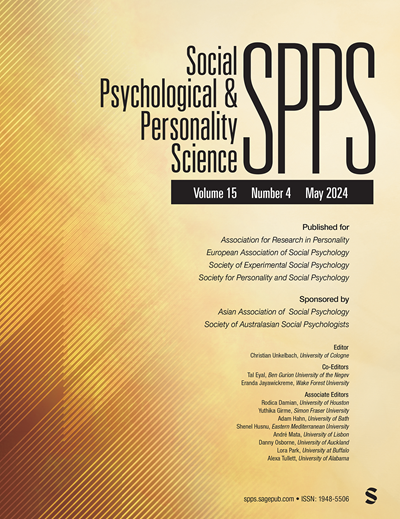随着时间的推移,阴谋论会影响或合理化疫苗接种的犹豫吗?
IF 3.3
2区 心理学
Q1 PSYCHOLOGY, SOCIAL
引用次数: 0
摘要
阴谋论与疫苗接种犹豫不决有关,这通常被解释为阴谋论助长了损害公众健康的世界观的证据。对这种关系的另一种经常被忽视的解释是,人们可能会通过阴谋论来合理化他们现有的疫苗接种犹豫。在2021年疫苗接种运动期间的多个时间点进行的两项小组研究中,我们测试了COVID-19阴谋信念与疫苗接种意图之间的时间关系。研究1(荷兰样本中的三波)提供了阴谋信念对疫苗接种犹豫和疫苗接种犹豫对阴谋信念的时间效应的证据。然而,研究2(美国样本中的两波)只支持随着时间的推移,疫苗接种犹豫对阴谋论的影响。尽管这些发现为阴谋信念增加疫苗接种犹豫不决的观点提供了一些支持,但它们更一致地支持另一种观点,即疫苗接种犹豫不决会增加阴谋信念。本文章由计算机程序翻译,如有差异,请以英文原文为准。
Do Conspiracy Theories Shape or Rationalize Vaccination Hesitancy Over Time?
Conspiracy beliefs are associated with vaccination hesitancy, which is commonly interpreted as evidence that conspiracy theories contribute to a worldview that damages public health. An alternative, and often ignored, explanation for this relationship is that people may rationalize their existing vaccination hesitancy through conspiracy theories. In two panel studies conducted at multiple time points during the vaccination campaign of 2021, we tested the temporal relationships between COVID-19 conspiracy beliefs and vaccination intentions. Study 1 (three waves in a Dutch sample) provided evidence for temporal effects of conspiracy beliefs on vaccination hesitancy and of vaccination hesitancy on conspiracy beliefs. Study 2 (two waves in a U.S. sample), however, only supported an effect of vaccination hesitancy on conspiracy beliefs over time. Although these findings provide some support for the idea that conspiracy beliefs shape increased vaccination hesitancy, they more consistently support the alternative idea that vaccination hesitancy shapes increased conspiracy beliefs.
求助全文
通过发布文献求助,成功后即可免费获取论文全文。
去求助
来源期刊

Social Psychological and Personality Science
PSYCHOLOGY, SOCIAL-
CiteScore
12.50
自引率
1.80%
发文量
77
期刊介绍:
Social Psychological and Personality Science (SPPS) is a distinctive journal in the fields of social and personality psychology that focuses on publishing brief empirical study reports, typically limited to 5000 words. The journal's mission is to disseminate research that significantly contributes to the advancement of social psychological and personality science. It welcomes submissions that introduce new theories, present empirical data, propose innovative methods, or offer a combination of these elements. SPPS also places a high value on replication studies, giving them serious consideration regardless of whether they confirm or challenge the original findings, with a particular emphasis on replications of studies initially published in SPPS. The journal is committed to a rapid review and publication process, ensuring that research can swiftly enter the scientific discourse and become an integral part of ongoing academic conversations.
 求助内容:
求助内容: 应助结果提醒方式:
应助结果提醒方式:


